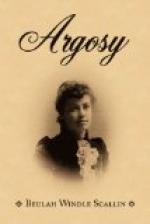Eliza, utterly wrapt in her child, saw her father’s growing love for him with secret delight; and one day when he had the boy on his knee, she ventured to speak out a thought that was often in her heart.
“Papa,” she said, with impassioned fervour, “he ought to be the heir, your own grandson; not Harry Carradyne.”
Captain Monk simply stared in answer.
“He lies in the direct succession; he has your own blood in his veins. Papa, you ought to see it.”
Certainly the gallant sailor’s manners were improving. For perhaps the first time in his life he suppressed the hot and abusive words rising to his tongue—that no son of that man, Hamlyn, should come into Leet Hall—and stood in silence.
“Don’t you see it, papa?”
“Look here, Eliza: we’ll drop the subject. When my brother, your uncle, was dying, he wrote me a letter, enjoining me to make Emma’s son the heir, failing a son of my own. It was right it should be so, he said. Right it is; and Harry Carradyne will succeed me. Say no more.”
Thus forbidden to say more, Eliza Hamlyn thought the more, and her thoughts were not pleasant. At one time she had feared her father might promote Kate Dancox to the heirship, and grew to dislike the child accordingly. Latterly, for the same reason, she had disliked Harry Carradyne; hated him, in fact. She herself was the only remaining child of the house, and her son ought to inherit.
She stood this evening at the drawing-room window, this and other matters running in her mind. Miss Kate, at the other end of the room, had prevailed on Uncle Harry (as she called him) to play a game at toy ninepins. Or perhaps he had prevailed on her: anything to keep her tolerably quiet. She was in her teens now, but the older she grew the more troublesome she became; and she was remarkably small and childish-looking, so that strangers took her to be several years younger than she really was.
“This must be your model governess arriving, Aunt Emma,” exclaimed Mrs. Hamlyn, as the fly came up the drive.
“I hope it is,” said Mrs. Carradyne; and they all looked out. “Oh, yes, that’s an Evesham fly—and a ramshackle thing it appears.”
“I wonder you did not send the carriage to Evesham for her, mother,” remarked Harry, picking up some of the ninepins which Miss Kate had swept off the table with her hand.
Mrs. Hamlyn turned round in a blaze of anger. “Send the carriage to Evesham for the governess! What absurd thing will you say next, Harry?”
The young man laughed in good humour. “Does it offend one of your prejudices, Eliza?—a thousand pardons, then. But really, nonsense apart, I can’t see why the carriage should not have gone for her. We are told she is a gentlewoman. Indeed, I suppose anyone else would not be eligible, as she is to be made one of ourselves.”
“And think of the nuisance it will be! Do be quiet, Harry! Kate ought to have been sent to school.”




